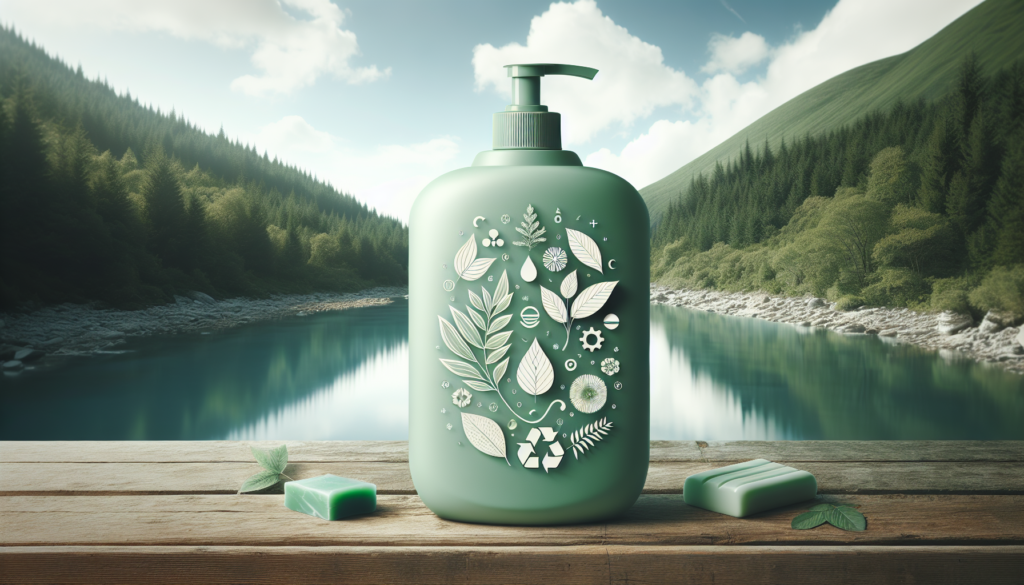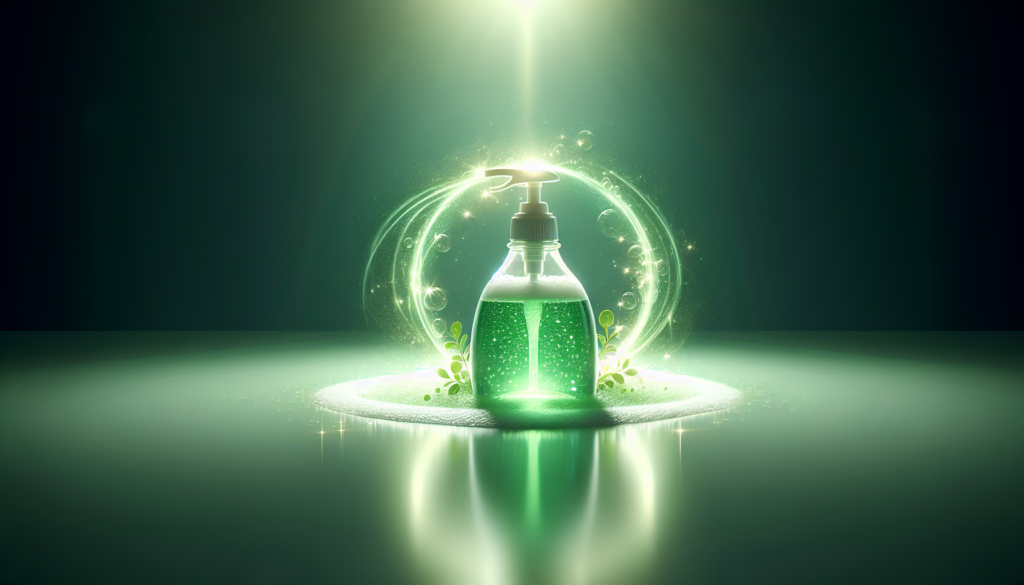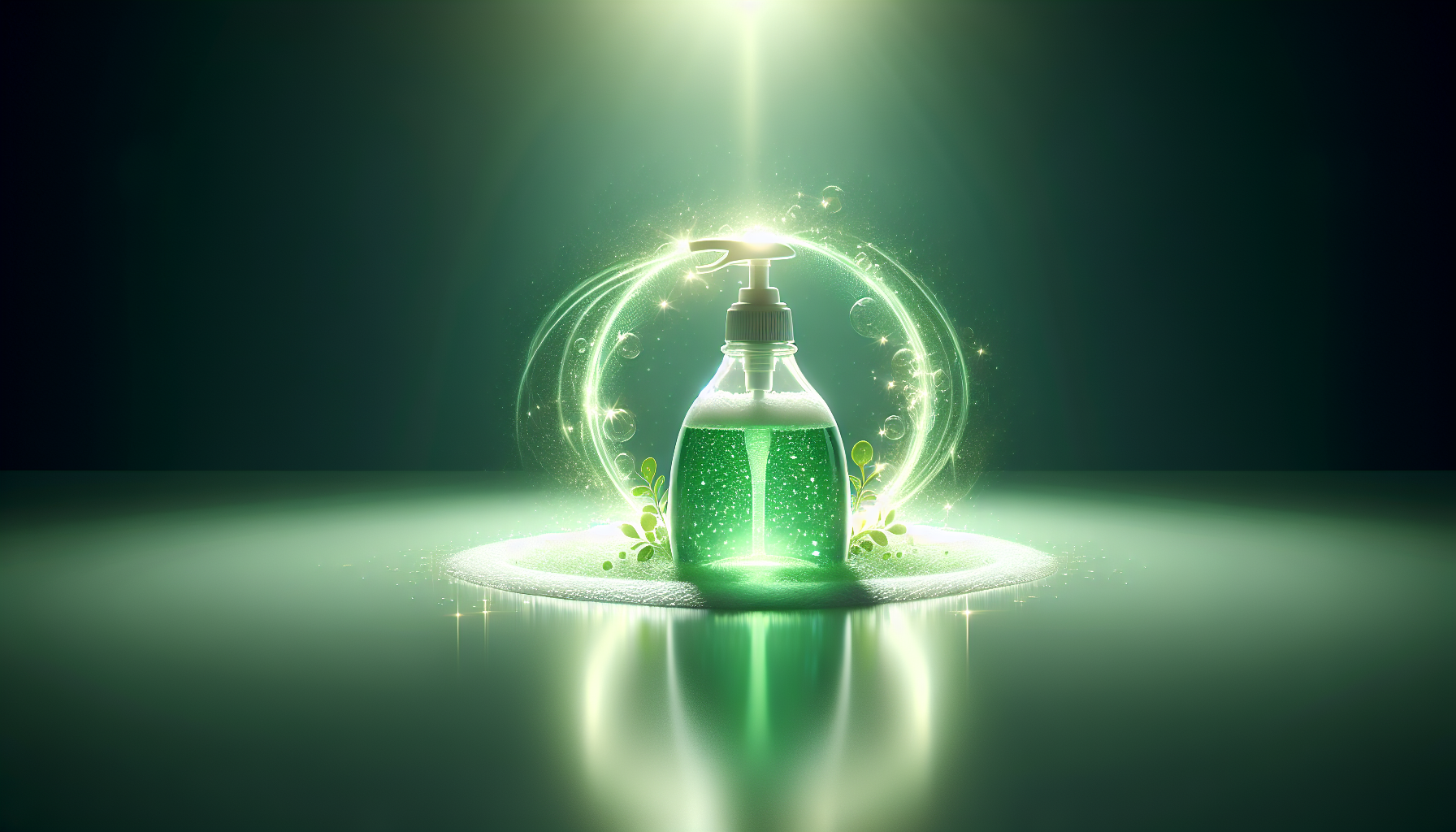In today’s world, where sustainability and environmental consciousness are becoming increasingly important, one area that we can all make a difference is in the products we use to clean our homes. Eco-friendly cleaning products offer an alternative to traditional chemical-laden cleaners, providing a host of benefits not only for the planet but also for our health. From reducing air pollution to protecting aquatic life, these eco-friendly options are not only effective but also contribute to a greener and healthier future for all.

What are eco-friendly cleaning products?
Definition of eco-friendly cleaning products
Eco-friendly cleaning products are cleaning solutions that are formulated with ingredients that are safer for both human health and the environment. These products are designed to minimize the use of harmful chemicals and reduce the negative impact on the ecosystem. They are usually made from natural or biodegradable ingredients and are free from toxins, harsh chemicals, and synthetic fragrances.
Importance of using eco-friendly cleaning products
Using eco-friendly cleaning products is essential for several reasons. Firstly, it promotes a healthier living environment by reducing the exposure to toxic chemicals commonly found in conventional cleaning products. These harsh chemicals can have adverse effects on human health, especially for individuals with allergies, asthma, or sensitivities. By using eco-friendly products, you can create a safer and more comfortable living space for you and your family.
Secondly, eco-friendly cleaning products are crucial for protecting the environment. Traditional cleaning products often contain chemicals that can harm aquatic life and contribute to water pollution. By opting for eco-friendly alternatives, you can minimize water pollution and reduce your ecological footprint. Additionally, eco-friendly cleaning products are often manufactured using sustainable practices that conserve resources and minimize waste.
Benefits of using eco-friendly cleaning products
1. Health benefits
One of the key benefits of using eco-friendly cleaning products is the positive impact on your health. Conventional cleaning products often contain harsh chemicals like ammonia, chlorine, and phthalates, which can trigger allergies, respiratory problems, and skin irritations. By choosing eco-friendly alternatives, you can reduce your exposure to these harmful substances and create a healthier indoor environment for yourself and your loved ones.
Eco-friendly cleaning products are formulated with natural ingredients that are less likely to cause allergic reactions or respiratory issues. They are often fragrance-free or use natural scents derived from essential oils, making them a safer choice for individuals with sensitivities. These products are also less likely to leave behind chemical residues, reducing the risk of accidental ingestion or exposure to dangerous toxins.
2. Environmental benefits
Another significant benefit of using eco-friendly cleaning products is their positive impact on the environment. Traditional cleaning products contain chemicals that can pollute water sources, damage ecosystems, and contribute to air pollution. The production and disposal of these products also contribute to greenhouse gas emissions and waste generation.
Eco-friendly cleaning products, on the other hand, are made from renewable resources and biodegradable ingredients that can break down naturally without harming the environment. They are often packaged using recyclable materials and produced using sustainable practices that minimize water usage, energy consumption, and carbon emissions. By choosing eco-friendly options, you can play a part in preserving the planet for future generations.
3. Cost-saving benefits
In addition to the health and environmental benefits, using eco-friendly cleaning products can lead to significant cost savings in the long run. While the upfront cost of eco-friendly products may be slightly higher than conventional ones, they are generally more concentrated and effective, requiring less product per use. This means that you can use them for a longer period before needing to restock.
Furthermore, some eco-friendly cleaning products can serve multiple purposes, eliminating the need for purchasing separate cleaners for different surfaces. For example, a plant-based all-purpose cleaner can effectively clean countertops, floors, and even glass surfaces, reducing the number of products you need to buy. By investing in quality eco-friendly cleaning products, you can save money over time and reduce the overall household expenses.
Types of eco-friendly cleaning products
1. Plant-based cleaners
Plant-based cleaners are eco-friendly cleaning products that are made from natural ingredients derived from plants. These ingredients typically include essential oils, citrus extracts, and plant-based surfactants. Plant-based cleaners are effective at removing dirt, grease, and stains without relying on harsh chemicals. They are biodegradable and do not leave behind harmful residues, making them safe for both human health and the environment.
2. Biodegradable cleaners
Biodegradable cleaners are another type of eco-friendly cleaning product that breaks down naturally into non-toxic elements once they are exposed to air, water, or bacteria. These cleaners are formulated with ingredients that can be decomposed by natural processes, reducing their impact on the environment. Biodegradable cleaners are often made from renewable resources and are free from harsh chemicals, making them an excellent choice for individuals who prioritize sustainability.
3. Non-toxic cleaners
Non-toxic cleaners are environmentally friendly cleaning products that are free from toxic substances and harmful chemicals. These cleaners are formulated to be safe for human health and do not pose a risk of allergic reactions or respiratory problems. Non-toxic cleaners are usually fragrance-free or use natural fragrances derived from essential oils. They are an ideal option for households with children, pets, or individuals with sensitivities.
Common natural ingredients used in eco-friendly cleaning products
1. Vinegar
Vinegar is a versatile ingredient commonly used in eco-friendly cleaning products. It has natural antimicrobial properties and can effectively remove dirt, grease, and grime. Vinegar can be used to clean various surfaces, including countertops, windows, and floors. It is especially useful for removing hard water stains and soap scum.
To create a simple vinegar-based cleaner, mix equal parts of distilled white vinegar and water in a spray bottle. You can also add a few drops of essential oils for a pleasant scent. This mixture can be used to clean and disinfect a wide range of surfaces in your home.
2. Baking soda
Baking soda, also known as sodium bicarbonate, is a natural ingredient that is commonly used as a gentle abrasive and deodorizer in eco-friendly cleaning products. It has the ability to remove tough stains, eliminate odors, and act as a natural cleaning agent. Baking soda can be used to clean sinks, tubs, toilets, and even carpets.
To make a simple baking soda cleaner, mix baking soda with a small amount of water to form a paste. Apply this paste to the surface you wish to clean, scrub gently, and rinse thoroughly. Baking soda is a safe and effective way to tackle tough stains and odors without relying on harsh chemicals.
3. Lemon juice
Lemon juice is a natural acid that has powerful cleaning properties. It is commonly used in eco-friendly cleaning products to remove stains, cut through grease, and refresh surfaces. Lemon juice can be used to clean kitchen countertops, cutting boards, and stainless steel appliances.
To create a lemon-based cleaner, mix equal parts of lemon juice and water in a spray bottle. This mixture can be used to clean and disinfect surfaces effectively. The natural acidity of lemon juice helps to break down dirt and grime while leaving behind a fresh and citrusy scent.
4. Essential oils
Essential oils are highly concentrated plant extracts that are commonly used in eco-friendly cleaning products for their natural fragrance and antimicrobial properties. Some popular essential oils used in cleaning products include lavender, tea tree, eucalyptus, and lemon. These oils not only add a pleasant scent to your cleaning routine but also help to kill germs and bacteria.
To incorporate essential oils into your cleaning routine, add a few drops of your preferred oil to a spray bottle filled with water or vinegar. Shake well to mix, and use this solution to clean and freshen up various surfaces. Essential oils can also be added to homemade cleaning recipes to enhance their cleaning power and leave behind a delightful scent.

Eco-friendly cleaning products for different surfaces
1. Kitchen surfaces
In the kitchen, it’s important to use eco-friendly cleaning products that are effective at cutting through grease and removing food stains. For kitchen surfaces such as countertops, stove, and sink, a mixture of equal parts vinegar and water can be used as a natural all-purpose cleaner.
For tough stains on cookware or oven racks, a paste made from baking soda and water can be applied and scrubbed gently. Rinse thoroughly to remove any residue.
2. Bathroom surfaces
Bathrooms require effective cleaning products that can remove soap scum, hard water stains, and grime. A vinegar and water solution is an excellent eco-friendly option for cleaning bathroom surfaces such as countertops, mirrors, and shower walls. For tough stains, let the solution sit for a few minutes before scrubbing or wiping clean.
To tackle toilet stains, mix baking soda and vinegar to create a fizzing cleaner. Pour the mixture into the toilet bowl, let it sit for a few minutes, then scrub and flush.
3. Floors
When cleaning floors, it’s important to choose eco-friendly products that are safe for the flooring material. For hardwood or laminate floors, a vinegar and water solution can be used as a gentle cleaner. Mix one cup of vinegar with one gallon of warm water and mop the floors as usual.
For tile or linoleum floors, a mixture of warm water and a few drops of mild eco-friendly dish soap can be used to remove dirt and grime. Avoid using excessive water, as it can seep into the grout and cause damage.
4. Windows and glass surfaces
To clean windows and glass surfaces, a vinegar and water solution is an effective and eco-friendly option. Mix equal parts vinegar and water in a spray bottle, and spray the solution onto the glass surface. Wipe clean with a microfiber cloth or a newspaper for a streak-free shine.
How to choose eco-friendly cleaning products
1. Look for eco-labels and certifications
When shopping for eco-friendly cleaning products, look for eco-labels and certifications that indicate the product’s environmental credentials. Some reputable eco-labels include the EPA Safer Choice label, Ecologo, and Green Seal. These labels ensure that the product has undergone rigorous testing and meets strict environmental and health criteria.
2. Read ingredient lists
Reading ingredient lists is crucial in determining whether a cleaning product is truly eco-friendly. Look for products that clearly disclose their ingredients and avoid those that contain harsh chemicals, such as bleach, ammonia, and phthalates. Opt for products that use plant-based or biodegradable ingredients, as they are more gentle on the environment.
3. Consider packaging materials
In addition to the product itself, consider the packaging materials used. Look for products that are packaged in recyclable or biodegradable materials, such as glass, aluminum, or cardboard. Avoid products that use excessive plastic packaging, as plastic waste is a significant environmental concern.
Making your own eco-friendly cleaning products
1. DIY all-purpose cleaner
Making your own all-purpose cleaner is simple and cost-effective. Mix equal parts vinegar and water in a spray bottle, and add a few drops of your favorite essential oil for a pleasant scent. Shake well before each use. This mixture can be used to clean countertops, sinks, appliances, and other household surfaces.
2. DIY glass cleaner
To create a DIY glass cleaner, mix one cup of water with one tablespoon of vinegar in a spray bottle. Spray the solution onto glass surfaces and wipe clean with a microfiber cloth or newspaper. This homemade glass cleaner is effective at removing streaks and smudges without leaving behind chemical residues.
3. DIY toilet cleaner
For a DIY toilet cleaner, mix half a cup of baking soda with half a cup of vinegar and pour the mixture into the toilet bowl. Let it sit for a few minutes, then scrub with a toilet brush and flush. The natural reaction between the baking soda and vinegar will help to remove stains and freshen up the toilet.
Tips for using eco-friendly cleaning products effectively
1. Follow instructions and dosage recommendations
To ensure maximum effectiveness and safety, it’s important to follow the instructions and dosage recommendations provided by the manufacturer. Using more or less product than recommended may not yield the desired results and could potentially be harmful.
2. Test on a small area first
If you are using a new eco-friendly cleaning product or a homemade solution, it’s always a good idea to test it on a small, inconspicuous area first. This will help you determine if the product is compatible with the surface and whether any adverse reactions or discoloration occur.
3. Properly store and dispose of products
Proper storage and disposal of eco-friendly cleaning products are essential for maintaining their effectiveness and minimizing environmental impact. Store products in a cool, dry place away from direct sunlight and out of reach of children and pets. When disposing of empty containers, follow local recycling guidelines and ensure they are properly cleaned before recycling.
Challenges and limitations of eco-friendly cleaning products
1. Availability and accessibility
One challenge of using eco-friendly cleaning products is their availability and accessibility. While eco-friendly options are becoming more mainstream, they may not be as readily available as conventional cleaning products in some areas. However, with the increasing demand for sustainable alternatives, more retailers are starting to stock eco-friendly products both in-store and online.
2. Effectiveness compared to conventional products
Another limitation of eco-friendly cleaning products is that they may not always be as effective as their conventional counterparts, especially when it comes to heavy-duty cleaning tasks or stubborn stains. However, advancements in eco-friendly formulations have resulted in highly effective products that can rival their conventional counterparts in terms of cleaning power.
It’s important to choose eco-friendly products that are specifically designed for the task at hand and to follow proper cleaning techniques to achieve the best results. In some cases, a little more elbow grease or pre-treatment may be required.
Conclusion
Eco-friendly cleaning products offer numerous benefits for both human health and the environment. They promote a healthier living environment, reduce the risk of allergic reactions and respiratory issues, and minimize water pollution and waste generation. With a wide range of options available, such as plant-based, biodegradable, and non-toxic cleaners, there is a solution for every cleaning need.
By choosing eco-friendly cleaning products, you can make a positive impact on the planet and contribute to a sustainable future. Whether through purchasing ready-made products or making your own, incorporating eco-friendly cleaning products into your routine is a simple and effective way to create a healthier and more environmentally conscious home. Start small, experiment with different products, and gradually transition to a more eco-friendly cleaning routine – the planet and future generations will thank you.

